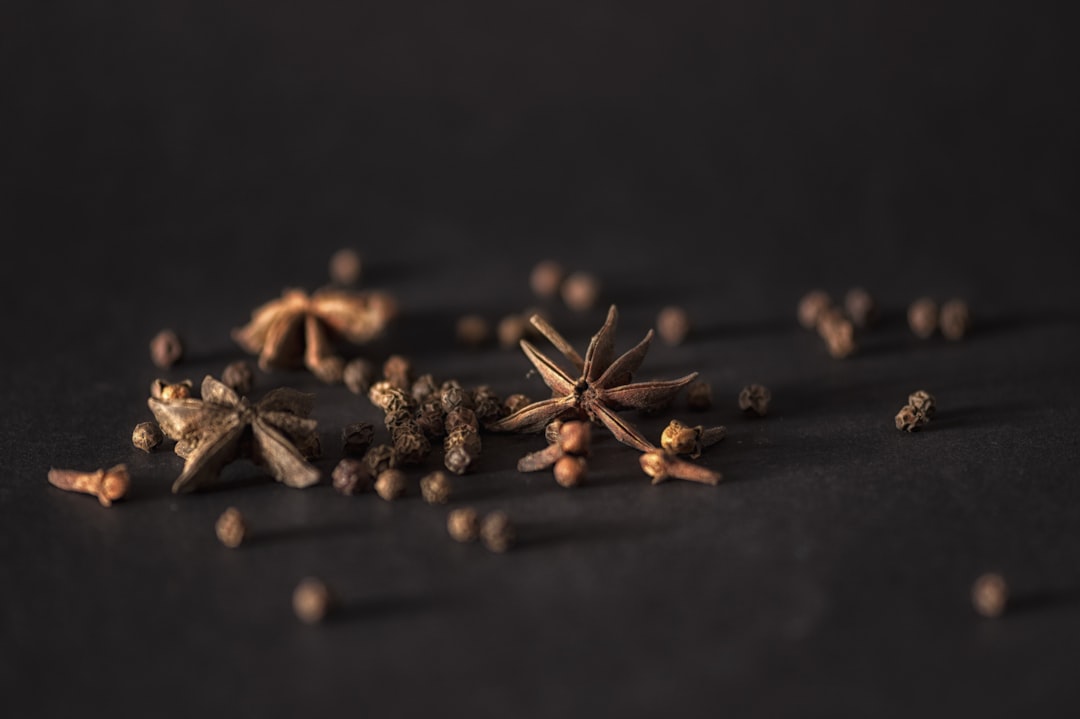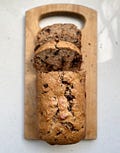Sometime around day 5 after testing positive for Covid, I lost my senses of smell and taste. It was like a light switched off. One second the vapors of my lemon ginger tea were connecting with my brain synapses, and the next second they weren’t. It took me a moment to realize what was happening - and then I panicked.
Yoshie and the kids were gone for the day, so I hurled myself out of bed (where I’d spent the majority of my quarantine) and shuffled to the kitchen where I began opening and huffing spices. Cinnamon, nothing. Cardamom, nada. The super potent smoked paprika Yoshie puts on everything…nope. Losing my sense of smell (and, relatedly taste) wasn’t a surprise - I was well aware that it was a possibility. But it still shocked me to my core.
I could register a food’s general sweetness or saltiness - two aspects of taste that aren’t explicitly linked to smell. And I could access the prickly heat from black pepper or hot sauce. But all of the complexities of flavor that make food so enjoyable were completely absent.
Over the next couple of days, I spiraled. There is just no other word for the all-consuming fear I felt. As a food writer, who relies on both of these senses to do my job, anosmia (the scientific name for the loss of smell) was my biggest Covid-related nightmare. And there I was, with a to-do list of recipes to develop and no way to know when my most important culinary tool would return.
For days, I woke up each morning and sniffed the bottles of essential oils I usually put in a diffuser. They are very strong - concentrated distillations of eucalyptus, anise, lavender, and peppermint. Some times I could swear I smelled a hint of something, though it seemed miles away. Other times, there was nothing. Void. Empty. Bare.
When I felt good enough to cook a bit, I went through the motions of cooking and eating to quell my hunger. But without taste, nothing satisfied. I could feel the creaminess of the half and half in my coffee on my tongue, but got none of the coffee’s bitter, chocolatey flavor. I cried a lot. I fretted and imagined worst case scenarios of having to figure out a new profession. I was worn down, missed my family and, above all, scared of the unknown. This was my first go-around with Covid and man, it is really something else.

Jewish Tradition’s Connection to Scent
I have always loved how Jewish tradition holds a special reverence for the power of scent. Like with many ancient religions, spices and incense (frankincense and myrrh, anyone?) once played a central role in religious Jewish rituals. Incense fell out of regular Jewish practice after the Holy Temple in Jerusalem was destroyed, but its use was codified in the book of Exodus:
And God said unto Moses: 'Take unto thee sweet spices, stacte, and onycha, and galbanum; sweet spices with pure frankincense; of each shall there be a like weight. And thou shalt make of it incense, a perfume after the art of the perfumer, seasoned with salt, pure and holy.
Today, Jews celebrate Sukkot with a lulav and etrog - a bumpy, yellow citrus fruit with a bright fragrance. Every year, after shaking the lulav and etrog in the sukkah, I dig a thumbnail into the etrog’s base to release the peel’s oils (haha, maybe I’m not supposed to do that?) and breathe in its zesty, floral smell. That private ritual is one of my favorite parts of Sukkot.
And on Saturday night when Shabbat ends, havdalah (a short ceremony that marks the transition between Shabbat and the new week) includes a blessing over fragrant spices called besamim. After saying the blessing, you smell the spices - often things like cloves, cinnamon, and star anise - as a way of “waking yourself up” from Shabbat’s time of rest.
Beyond ritual, of course, Jewish tradition is also bound up with food smells. For me, that includes the piney aroma of fresh dill that pulls my heartstrings more than a fresh herb should, the rich and garlicky smell of chicken soup, and the way freshly baked challah perfumes the entire house.
During the days where I completely lost my sense of smell - and most of my taste - the world felt muted and distant. I felt unmoored and disoriented, and almost like part of my soul had evaporated. If that sounds a little bit dramatic, I agree. But the Hebrew words for smell (reyach) and soul (ruach) are linguistically connected for a reason.
Don’t Call it A Comeback (Yet)
I wish I could report that my senses of smell and taste are totally back. They are significantly better than before - I would say 65 to 80% of what I think of as normal, depending on the day. (Yes, it weirdly fluctuates.) I can taste tomato sauce’s tangy acidity again, but some of the undertones of oregano and roasted garlic are still fuzzy. The aroma of my morning coffee is back, but don’t ask me to describe any subtle tasting notes.
There are moments where I swear I can feel my brain fighting to access a scent that I once took for granted. It usually gets there, but it isn’t a seamless process. I can feel the gears grinding.
I know it can take time, post-Covid - sometimes weeks or months - for smell and taste to fully return. I know that most people do eventually get back to their pre-Covid sensory baseline. (And thanks to my friend Sarah, who graciously did some research for me when I was feeling super overwhelmed, I learned about the method of olafactory training that has helped some people in their journey back to smell.)
But I also know, both through the story of a dear family member, and the anecdotes of social media acquaintances, that there is a possibility of it never fully returning, or of it returning and then vanishing again a few months later, or later going haywire with parosmia.
I cannot predict the future, but for now I am grateful. Every week or so, I bake banana bread with Beatrice. It’s become a little ritual of ours. I peel the bananas, she mashes. I measure the sugar, she pours. I crack the egg, she stirs. Last week, about 30 minutes after I put the banana bread into the oven, I caught a whiff of caramelized sugar and cinnamon - usually my telltale sign that the bread is nearly ready. It was the first thing I noticed smelling since my Covid diagnosis, and I immediately burst into tears.
Over the next few days, as more smells and tastes began to return, I made sure to stop, smell, and really focus my intention on my food as I ate. My smell wasn’t completely gone for long, but it doesn’t take long to be reminded of how precious our miraculous bodies are.
The irony is not lost on me that the first thing I could smell after my Covid diagnosis was banana bread, which undoubtedly wins as the pandemic’s most notable baked good. This week, I decided to lean into that irony and update my usual banana bread recipe with some extra fragrance. Instead of oil or melted butter, I stirred tahini into the batter, which gave the loaf a lovely, nutty scent. (You could stick with an equal amount of butter or oil, if tahini in baked goods isn’t your thing.) And to the usual cinnamon and nutmeg Bea and I use, I added a bit of cardamom, which gives off one of life’s most delicious scents.
This banana bread smells amazing, friends - and it tastes great too. And now I know how lucky I am to be able to say that.
Tahini Banana Bread with Chocolate
Makes 1 loaf
2 large overripe bananas, peeled
1/3 cup well-stirred tahini (or substitute vegetable oil or melted butter)
2/3 cup granulated sugar
1 large egg
1 teaspoon vanilla extract
1 1/2 teaspoons ground cinnamon
1/2 teaspoon ground cardamom, optional
1/4 teaspoon ground nutmeg
1 1/4 cups (175 g) all-purpose flour
2 tablespoons ground flax seeds (optional - I add it because it sneaks some omega 3s into the kids’ snack)
3/4 teaspoon baking soda
1/4 teaspoon kosher salt
4 ounces semisweet or bittersweet chocolate, chopped (or a generous handful of chocolate chips)
Preheat the oven to 350°F, and line an 8.5 x 4.5-inch loaf pan with parchment paper, allowing the paper to hang over on two opposite sides. (You can use an 8 x 4 or a 9 x 5 inch loaf pan, but the bake time will be slightly longer/shorter.)
Mash the bananas very well in a large bowl. Add the tahini, sugar, egg, vanilla, cinnamon, cardamom, if using, and nutmeg, and mix well to combine.
Add the flour, flax seeds, if using, baking soda, and salt and stir to form a thick batter. Add the chopped chocolate and stir to combine.
Transfer the batter to the prepared loaf pan and smooth the top. Bake until a tester inserted into the center of the loaf comes about clean, 40 to 50 minutes.
Remove from the oven and let cool for a few minutes in the pan, then use the overhanging parchment to gently lift the banana bread out of the pan and it transfer to a wire rack to cool. Serve slightly warm or at room temperature. Store leftovers, wrapped well, in the fridge for up to 1 week.





I’m so sorry that you experienced the profound loss of smell! Your recipe comes at the right moment, I need to take “something sweet” to a Boxing Day brunch - an antidote to bagels, lox, etc. This banana bread will be perfect! A continued wish for health & happiness during Chanukah!
Leah, oh my! I am so with you. Losing smell scared the heck out of me when I had Covid. I love this post and your ability to pivot and write so beautifully in the face of fear. Heal well. ❤️